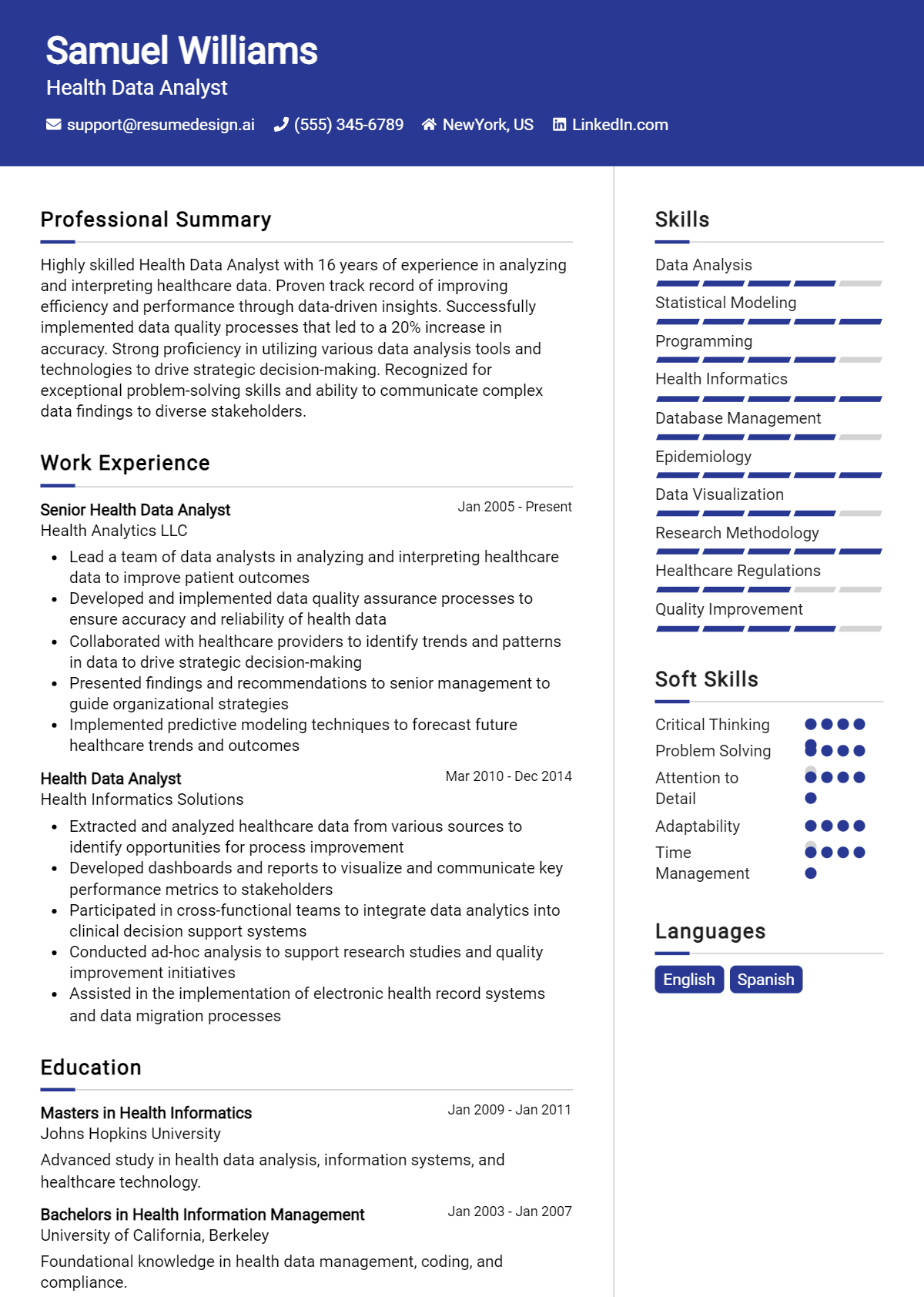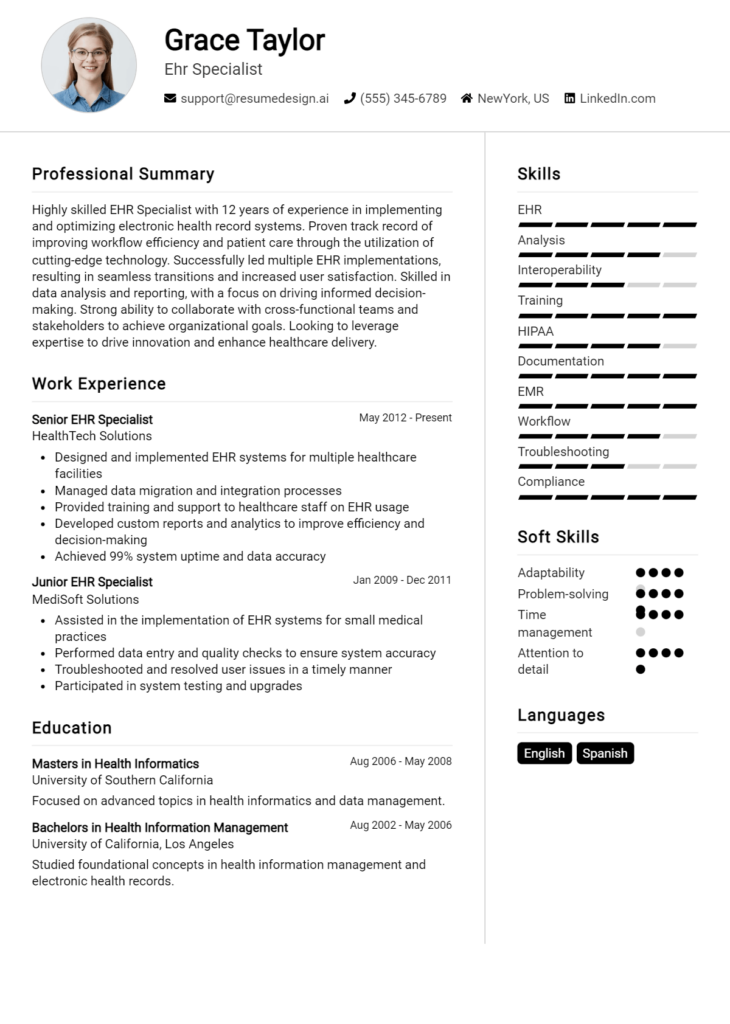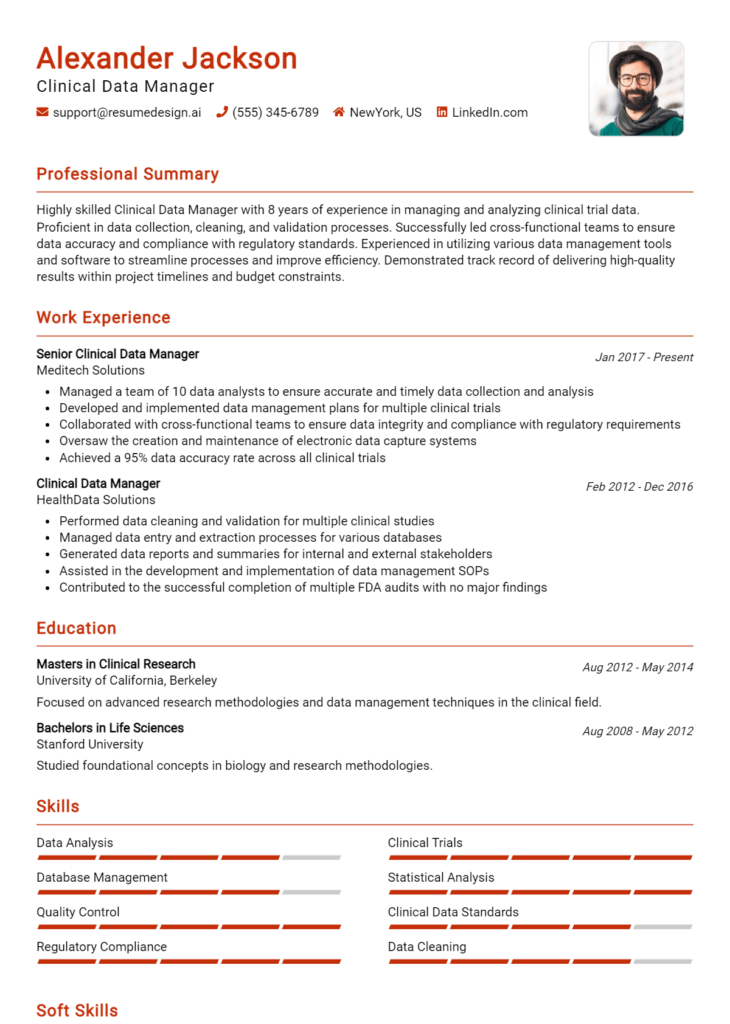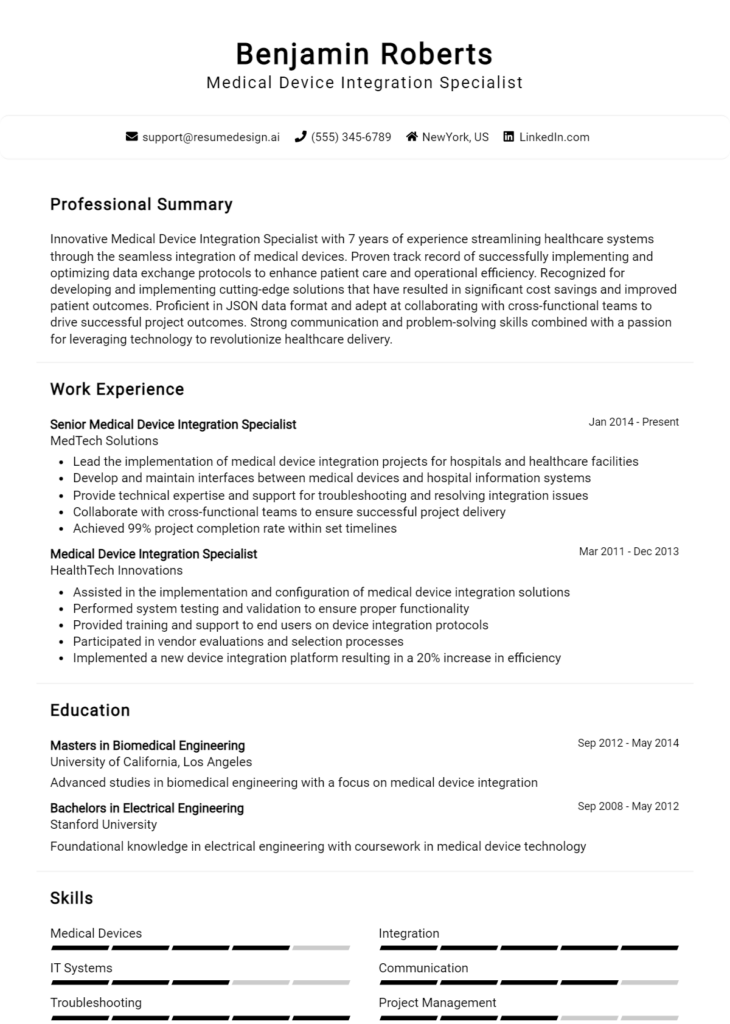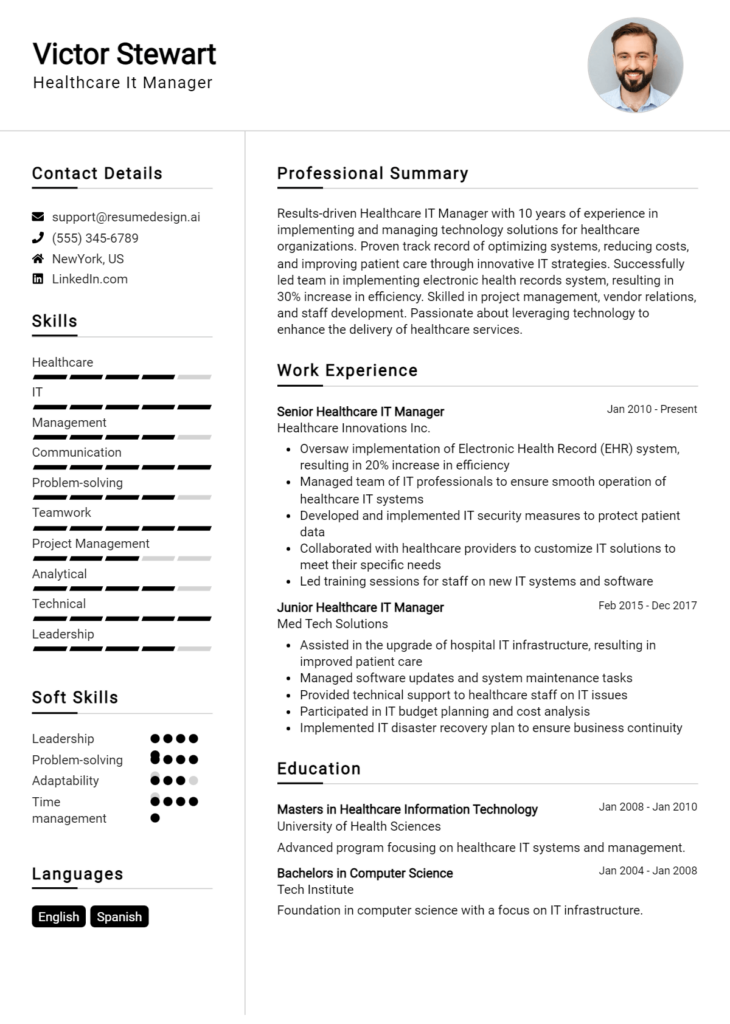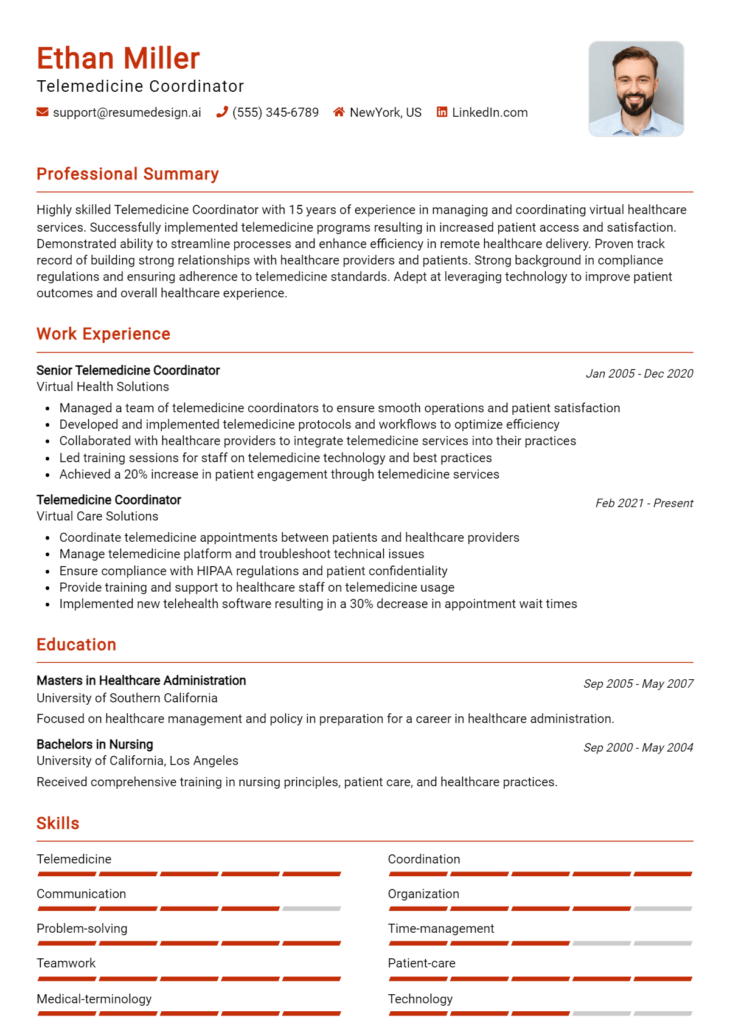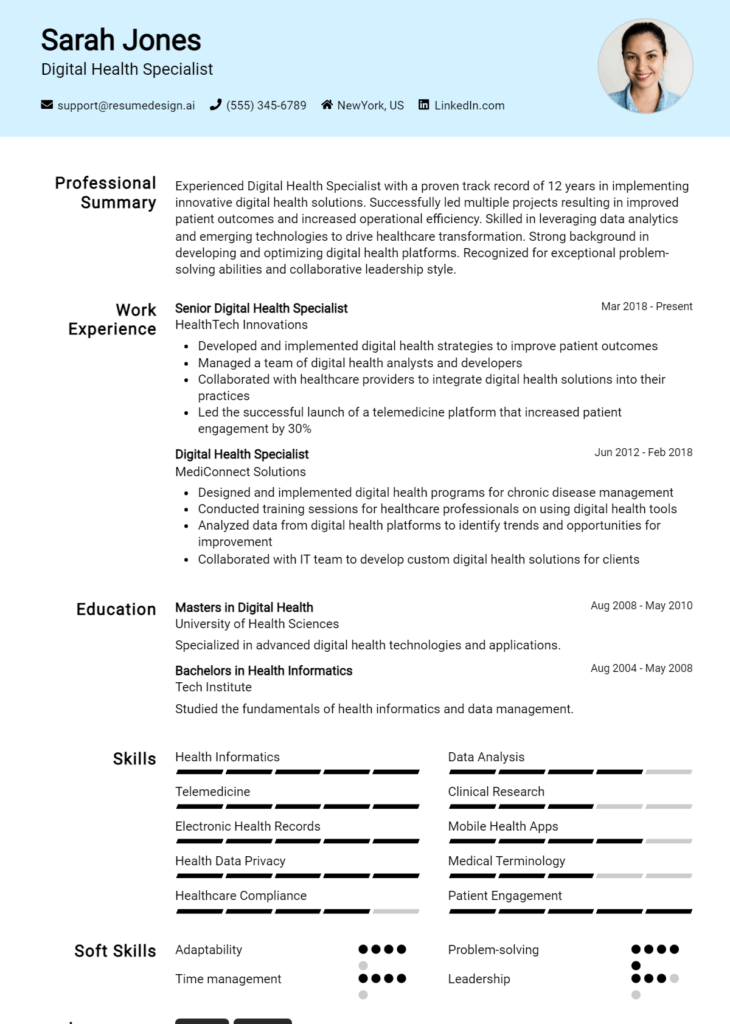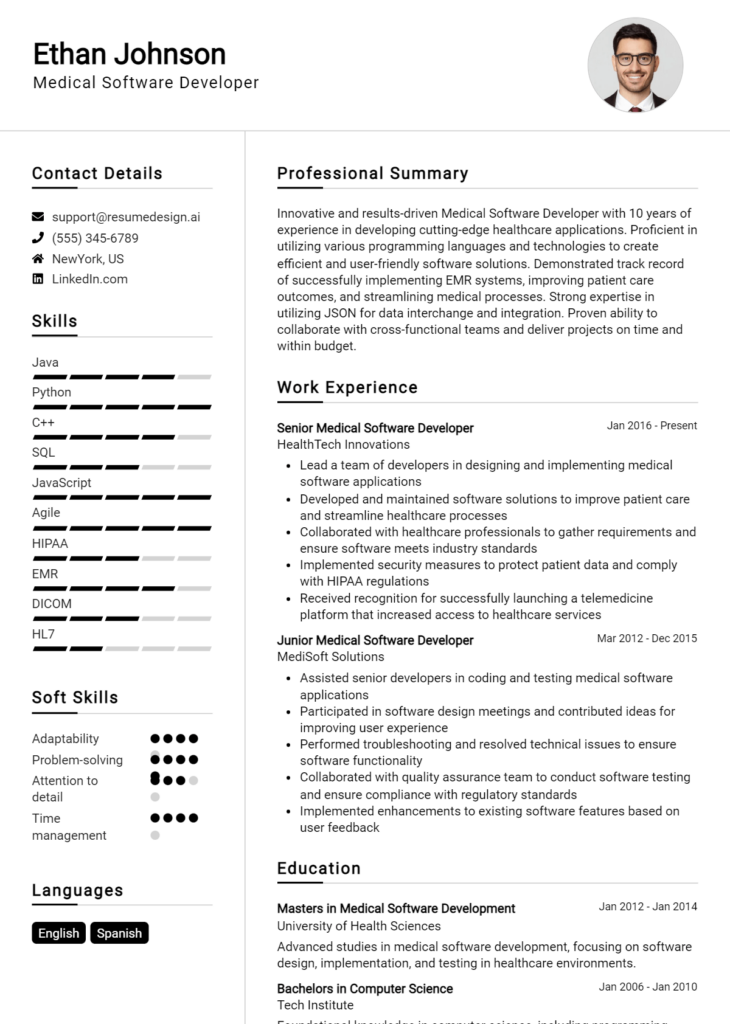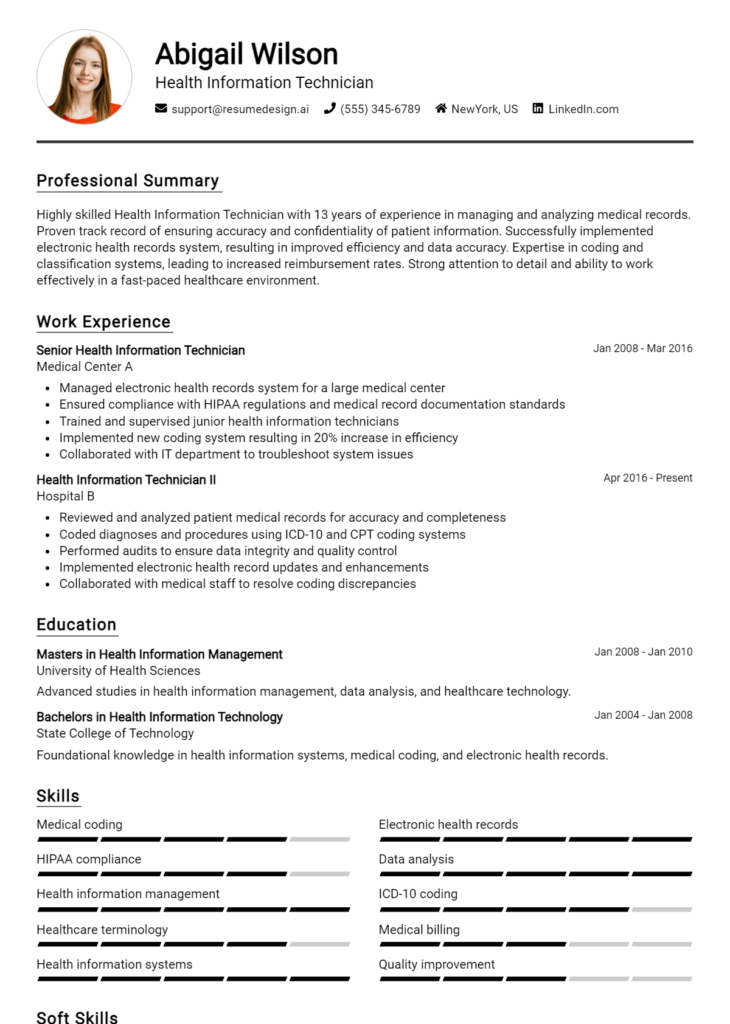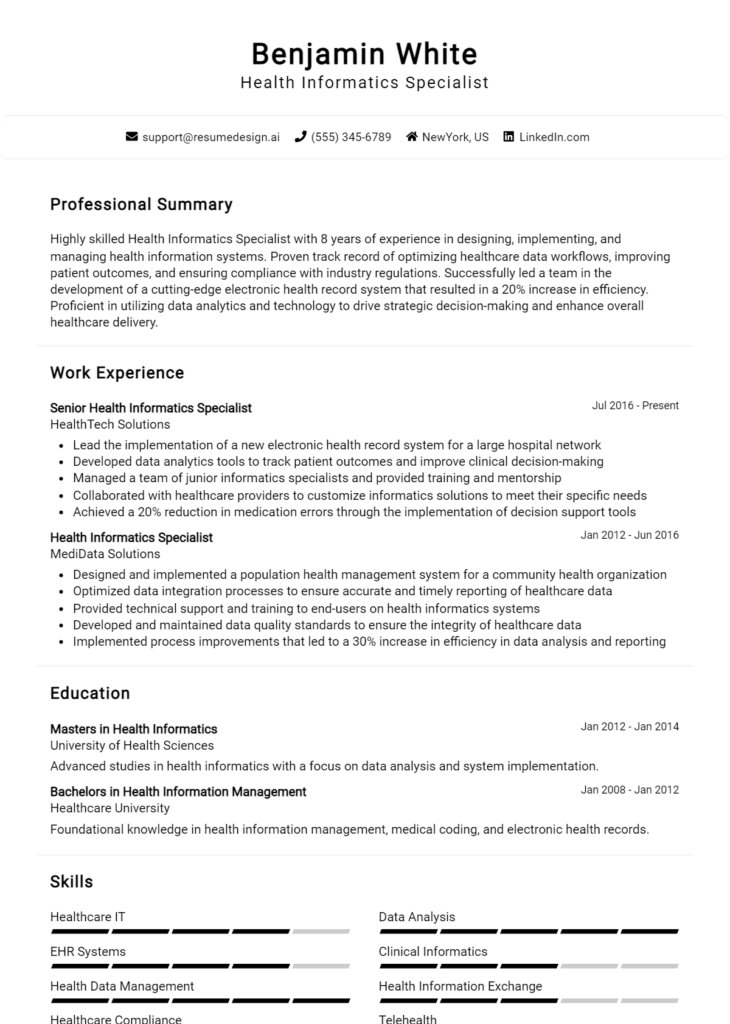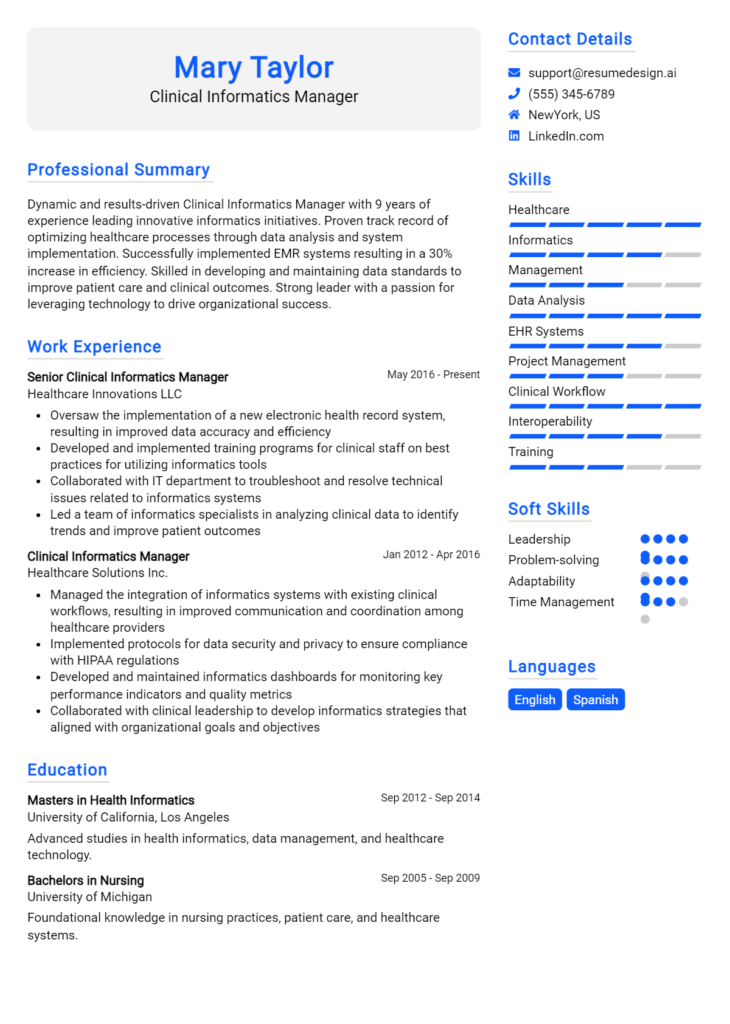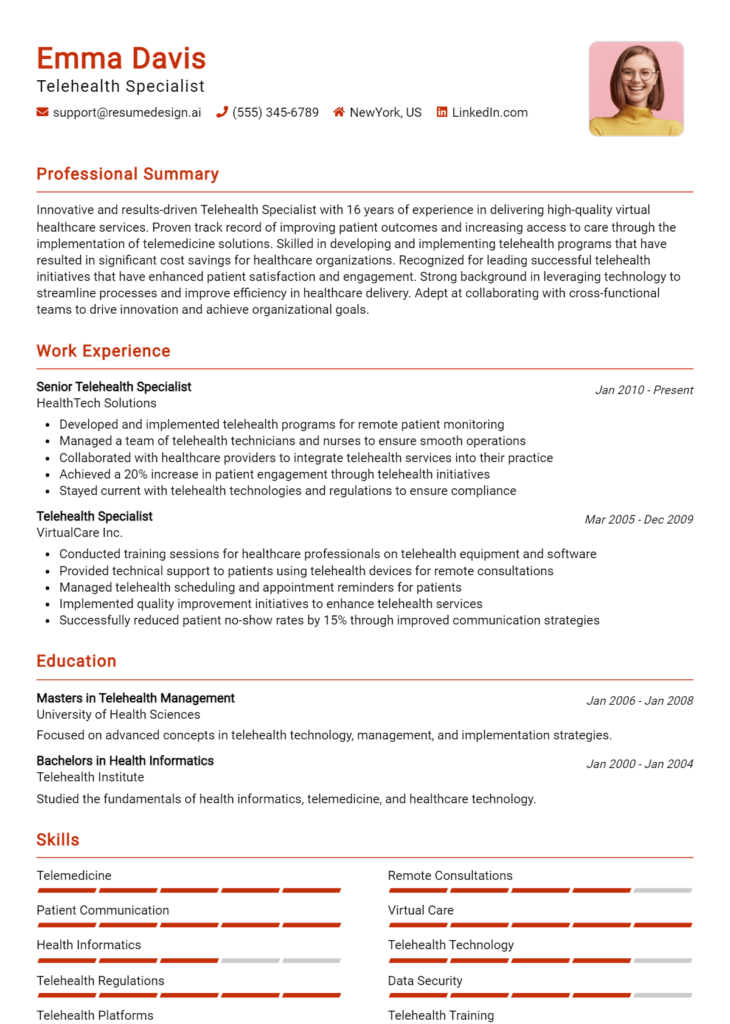Health Data Analyst Core Responsibilities
A Health Data Analyst plays a crucial role in bridging departments by analyzing healthcare data to inform decision-making and improve patient outcomes. Key responsibilities include data collection, cleaning, and interpretation, requiring strong technical skills in statistical software and databases. Operationally, they collaborate with clinical and administrative teams to identify trends and solve problems. Effective communication and analytical abilities are essential for translating data insights into actionable strategies, contributing significantly to the organization's goals. A well-structured resume can effectively showcase these qualifications, highlighting both technical expertise and problem-solving capabilities.
Common Responsibilities Listed on Health Data Analyst Resume
- Collect and manage healthcare data from various sources.
- Analyze and interpret complex datasets to identify trends and patterns.
- Prepare detailed reports and visualizations for stakeholders.
- Collaborate with clinical and administrative teams to enhance data utilization.
- Ensure data accuracy and integrity through rigorous validation processes.
- Develop and implement data management protocols and best practices.
- Utilize statistical software for predictive modeling and analytics.
- Present findings and recommendations to non-technical audiences.
- Participate in research initiatives to support evidence-based practices.
- Stay updated on healthcare regulations and data management standards.
- Assist in the development of health information systems.
High-Level Resume Tips for Health Data Analyst Professionals
In today's competitive job market, a well-crafted resume is crucial for Health Data Analyst professionals looking to make a strong first impression on potential employers. Your resume serves as your personal marketing tool, showcasing not only your skills but also your achievements in the field of health data analysis. It's essential to present a clear and compelling narrative that highlights your expertise in interpreting complex data sets, understanding healthcare metrics, and driving data-driven decision-making. This guide will provide practical and actionable resume tips specifically tailored for Health Data Analyst professionals, ensuring that your resume stands out in a crowded field.
Top Resume Tips for Health Data Analyst Professionals
- Tailor your resume to the specific job description, emphasizing the skills and experiences that align with the role.
- Highlight relevant experience by including specific positions in healthcare, data analysis, or related fields.
- Quantify your achievements with metrics and data where possible, such as improved efficiency percentages or cost savings.
- Showcase your proficiency in analytics tools and software commonly used in the industry, such as SQL, R, Python, or Tableau.
- Include certifications and relevant training, such as Certified Health Data Analyst (CHDA) or any other pertinent qualifications.
- Utilize action verbs to convey your contributions effectively, making your responsibilities and achievements more impactful.
- Incorporate industry-specific terminology and keywords that align with the job posting to pass through applicant tracking systems.
- Keep the format clean and professional, ensuring that your resume is easy to read and visually appealing.
- Limit your resume to one or two pages, focusing on the most relevant and recent experiences to maintain clarity.
- Proofread for grammatical errors and typos, as attention to detail is critical in data analysis roles.
Implementing these tips can significantly increase your chances of landing a job in the Health Data Analyst field. By presenting a polished and strategically tailored resume, you'll be better positioned to capture the attention of hiring managers and demonstrate your value as a candidate who can leverage data to enhance healthcare outcomes.
Why Resume Headlines & Titles are Important for Health Data Analyst
In the competitive field of health data analysis, a well-crafted resume headline or title serves as a critical first impression for potential employers. It encapsulates a candidate's key qualifications and areas of expertise in a succinct phrase that can grab the attention of hiring managers quickly. A strong headline not only highlights the applicant's relevant skills and experience but also aligns with the specific role being applied for, making it easier for recruiters to assess fit. Given the fast-paced nature of hiring, having a concise and impactful resume headline can set the tone for the rest of the resume and significantly influence a candidate's chances of being noticed.
Best Practices for Crafting Resume Headlines for Health Data Analyst
- Keep it concise: Aim for one to two lines that summarize your qualifications.
- Be role-specific: Tailor the headline to reflect the specific health data analyst position you are applying for.
- Highlight key skills: Include critical skills or areas of expertise relevant to the job.
- Use action words: Start with strong action verbs to create a sense of proactivity.
- Quantify achievements: If possible, include quantifiable results to showcase your impact.
- Stay professional: Avoid using overly casual language or jargon that may confuse readers.
- Make it unique: Differentiate yourself from other candidates by showcasing your unique strengths.
- Align with industry keywords: Incorporate industry-specific terms that align with the job description.
Example Resume Headlines for Health Data Analyst
Strong Resume Headlines
"Detail-Oriented Health Data Analyst with 5 Years of Experience in Predictive Analytics"
“Certified Health Data Analyst Specializing in Patient Outcome Improvement and Data Visualization”
“Results-Driven Data Analyst with Proven Track Record in Reducing Healthcare Costs by 20%”
Weak Resume Headlines
“Data Analyst Looking for Opportunities”
“Experienced Professional Seeking Job”
The strong headlines are effective because they are specific, convey valuable information about the candidate’s skills and experience, and directly relate to the health data analyst role. They allow hiring managers to quickly understand what the candidate brings to the table. In contrast, the weak headlines fail to impress due to their generic nature, lacking any detail that would help the applicant stand out. They do not communicate the candidate's unique strengths or qualifications, making it difficult for recruiters to gauge their potential fit for the position.
Writing an Exceptional Health Data Analyst Resume Summary
A well-crafted resume summary is crucial for a Health Data Analyst, as it serves as the first impression for hiring managers. This brief paragraph should effectively encapsulate the candidate's key skills, relevant experience, and notable accomplishments, all while aligning with the specific requirements of the job. A strong summary not only attracts attention but also conveys the candidate's value proposition in a concise and impactful manner, setting the stage for a deeper exploration of their qualifications in the rest of the resume.
Best Practices for Writing a Health Data Analyst Resume Summary
- Quantify Achievements: Use numbers and statistics to demonstrate the impact of your work.
- Focus on Relevant Skills: Highlight key skills that are directly applicable to the job description.
- Tailor for the Job: Customize your summary for each application to reflect the specific role's requirements.
- Keep it Concise: Aim for 3-5 sentences that succinctly convey your expertise without overwhelming details.
- Use Action Verbs: Start sentences with strong action verbs to emphasize your contributions and achievements.
- Showcase Industry Knowledge: Incorporate terminology and concepts relevant to the health data analytics field.
- Emphasize Soft Skills: Don’t forget to include interpersonal skills that are valuable in collaborative environments.
- Include Certifications: If applicable, mention relevant certifications that enhance your credibility as a health data analyst.
Example Health Data Analyst Resume Summaries
Strong Resume Summaries
Results-driven Health Data Analyst with over 5 years of experience in transforming complex datasets into actionable insights, leading to a 30% improvement in patient care outcomes at XYZ Healthcare. Proficient in SQL, Python, and advanced statistical analysis, with a proven track record of optimizing data collection processes to enhance operational efficiency.
Detail-oriented Health Data Analyst skilled in utilizing predictive modeling and machine learning algorithms to identify trends and inform strategic decision-making. Successfully managed data projects that resulted in a 25% reduction in hospital readmission rates, demonstrating a commitment to improving healthcare quality and efficiency.
Dedicated Health Data Analyst with expertise in electronic health records (EHR) systems and data visualization tools. Played a key role in a major data integration project that streamlined reporting processes, yielding a 40% decrease in report generation time and significantly improving stakeholder access to critical health information.
Weak Resume Summaries
Health Data Analyst with some experience in data analysis and healthcare. I am looking for a position where I can apply my skills.
Experienced analyst with a background in health data. I am a team player and willing to learn new things.
The strong resume summaries stand out due to their specificity, quantifiable achievements, and direct relevance to the role of a Health Data Analyst. They provide concrete examples of past successes and showcase the candidate's expertise in relevant tools and methodologies. In contrast, the weak summaries lack detail and fail to convey the candidate’s value or unique contributions, making them less compelling and memorable to hiring managers.
Education and Certifications Section for Health Data Analyst Resume
The education and certifications section of a Health Data Analyst resume plays a critical role in showcasing a candidate's academic qualifications and commitment to professional development in a rapidly evolving field. This section not only highlights the foundational knowledge acquired through formal education but also emphasizes relevant certifications and specialized training that demonstrate a dedication to continuous learning. By including pertinent coursework and industry-recognized credentials, candidates can significantly enhance their credibility and alignment with the specific requirements of the job role, making a compelling case to potential employers.
Best Practices for Health Data Analyst Education and Certifications
- Prioritize relevant degrees such as a Bachelor's or Master's in Health Informatics, Data Science, or Public Health.
- Include industry-recognized certifications like Certified Health Data Analyst (CHDA) or Certified Analytics Professional (CAP).
- Highlight relevant coursework that demonstrates proficiency in data analysis, statistics, and health informatics.
- Provide details on any specialized training in software tools commonly used in health data analysis, such as SAS, SQL, or R.
- Keep the information concise and focused on qualifications that directly relate to the Health Data Analyst role.
- Update the section regularly to reflect new certifications or completed courses to show ongoing professional development.
- Use bullet points for clarity and to make the information easy to skim for hiring managers.
- Consider including GPA or honors if they are particularly strong or relevant to the position applied for.
Example Education and Certifications for Health Data Analyst
Strong Examples
- Bachelor of Science in Health Informatics, University of XYZ, Graduated May 2022
- Certified Health Data Analyst (CHDA), American Health Information Management Association, Issued June 2023
- Relevant Coursework: Biostatistics, Data Mining, and Health Information Systems
- Master of Public Health (MPH), Specialization in Epidemiology, University of ABC, Expected Graduation December 2024
Weak Examples
- Bachelor of Arts in English Literature, University of DEF, Graduated May 2015
- Certification in Basic Excel Skills, Completed January 2020
- Relevant Coursework: Creative Writing, Shakespearean Studies, and Art History
- Outdated Certification: Microsoft Office Specialist, Issued July 2018
The strong examples are considered effective because they directly relate to the skills and knowledge required for a Health Data Analyst position, showcasing relevant degrees, recognized certifications, and pertinent coursework. In contrast, the weak examples illustrate a lack of connection to the field, featuring unrelated degrees and outdated or irrelevant certifications that do not support the candidate’s qualifications for the role.
Top Skills & Keywords for Health Data Analyst Resume
In the rapidly evolving field of healthcare, the role of a Health Data Analyst has become increasingly critical. A well-crafted resume that effectively showcases relevant skills is essential for standing out to potential employers. The right combination of hard and soft skills not only demonstrates technical proficiency but also highlights the ability to communicate complex data insights effectively to diverse audiences. As candidates prepare their resumes, they should focus on incorporating these key skills to enhance their prospects in this competitive job market.
Top Hard & Soft Skills for Health Data Analyst
Soft Skills
- Analytical Thinking
- Communication Skills
- Problem-Solving
- Attention to Detail
- Team Collaboration
- Adaptability
- Time Management
- Critical Thinking
- Interpersonal Skills
- Data Visualization
Hard Skills
- Statistical Analysis
- Proficiency in SQL
- Data Mining Techniques
- Knowledge of Healthcare Regulations (e.g., HIPAA)
- Experience with Data Visualization Tools (e.g., Tableau, Power BI)
- Familiarity with Electronic Health Records (EHR)
- Programming Skills (e.g., Python, R)
- Experience with Data Warehousing
- Proficient in Microsoft Excel
- Understanding of Database Management Systems
For more insights on essential skills and effective presentation of work experience, candidates can explore additional resources to refine their resumes further.
Stand Out with a Winning Health Data Analyst Cover Letter
Dear [Hiring Manager's Name],
I am writing to express my interest in the Health Data Analyst position at [Company Name], as advertised on [Where You Found the Job Posting]. With a strong background in data analysis, statistics, and healthcare informatics, I am excited about the opportunity to contribute to your team by transforming complex health data into actionable insights that improve patient care and operational efficiency. My educational background in Public Health, combined with hands-on experience in data management and analysis, equips me with the skills necessary to excel in this role.
In my previous position at [Previous Company Name], I successfully analyzed large datasets to identify trends and patterns that informed strategic decisions. By utilizing tools such as SQL, Python, and Tableau, I developed comprehensive reports and visualizations that not only communicated findings to non-technical stakeholders but also guided initiatives aimed at improving patient outcomes. One of my key projects involved optimizing patient scheduling processes, which resulted in a 20% reduction in wait times and significantly enhanced patient satisfaction scores. I am eager to bring this analytical expertise to [Company Name] to help drive similar impactful initiatives.
I am particularly impressed by [Company Name]'s commitment to leveraging data for innovation in healthcare. I am excited about the possibility of collaborating with your multidisciplinary team to harness data analytics in addressing critical health challenges. My strong communication skills and ability to interpret complex data will enable me to effectively bridge the gap between clinical staff and data-driven decision-making, ensuring that your organization continues to thrive in a rapidly evolving healthcare landscape.
Thank you for considering my application. I am looking forward to the opportunity to discuss how my skills and experiences align with the needs of your team at [Company Name]. I am eager to contribute to your mission of improving health outcomes through data-driven strategies. Please feel free to contact me at [Your Phone Number] or [Your Email Address] to schedule a conversation.
Sincerely,
[Your Name]
Common Mistakes to Avoid in a Health Data Analyst Resume
When crafting a resume for a Health Data Analyst position, it's essential to present your skills and experiences effectively to stand out in a competitive job market. However, many candidates make common mistakes that can undermine their chances of landing an interview. Avoiding these pitfalls can significantly enhance the impact of your resume and showcase your qualifications in the best light.
Lack of Specificity: Failing to provide specific examples of your accomplishments can make your resume feel vague. Quantify your successes with metrics, such as "increased efficiency by 20% through data analysis."
Overloading with Jargon: While industry terminology is important, overusing jargon can alienate readers. Use clear language and explain technical terms where necessary to ensure comprehension.
Ignoring Job Descriptions: Not tailoring your resume to match the job description can result in missed opportunities. Highlight relevant experiences and skills that align with the specific requirements of the position.
Neglecting Formatting: A cluttered or inconsistent format can detract from the professionalism of your resume. Use clear headings, bullet points, and a clean layout to enhance readability.
Missing Soft Skills: Focusing solely on technical skills while neglecting soft skills like communication, teamwork, and problem-solving can limit your appeal. Health Data Analysts often work with cross-functional teams, making these skills crucial.
Omitting Relevant Certifications: Failing to include relevant certifications or training can weaken your resume. Highlight any certifications like Certified Health Data Analyst (CHDA) or coursework in data analytics.
Not Showcasing Continuous Learning: The field of health data is constantly evolving. Not mentioning ongoing education, workshops, or relevant courses can suggest a lack of initiative to stay updated with industry trends.
Listing Responsibilities Instead of Achievements: Simply listing job duties without emphasizing achievements can make your resume less compelling. Focus on what you accomplished in each role to demonstrate your impact.
Conclusion
In summary, the role of a Health Data Analyst is crucial in transforming raw health data into actionable insights that can improve patient care and operational efficiency. Key responsibilities include data collection, analysis, and reporting, which require proficiency in statistical software and a strong understanding of healthcare metrics. Furthermore, effective communication skills are essential for presenting findings to healthcare professionals and stakeholders.
Given the competitive nature of the job market, it's vital to ensure that your resume stands out. A well-crafted resume highlights your analytical skills, relevant experience, and educational background effectively. If you're looking to enhance your resume for a Health Data Analyst position, consider using available resources to help you present your qualifications in the best light.
We encourage you to take action now: review your Health Data Analyst resume and make sure it aligns with industry standards. Explore the following tools to assist you in this process:
- Check out resume templates to find a design that fits your style.
- Use the resume builder for a step-by-step guide to create a professional-looking resume.
- Look at resume examples to gather ideas and inspiration from successful candidates.
- Don’t forget to customize your application with a compelling cover letter using our cover letter templates.
Take the next step towards landing your ideal job in health data analytics by refining your resume today!

